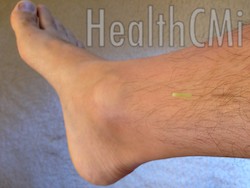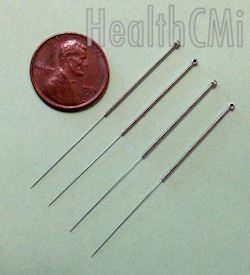A new MRI study demonstrates that acupuncture affects the brain very differently for sleep deprived patients than patients with normal sleep. The fMRI (functional magnetic resonance imaging) images show distinctly different patterns in the cerebellum.  The brain’s cerebellum is an area of the brain active in motor control, balance, mood, fear, pleasure, heart rate, blood pressure changes, language use and cognition. These results mark a clear difference in how acupuncture affects the brain under different circumstances.
The brain’s cerebellum is an area of the brain active in motor control, balance, mood, fear, pleasure, heart rate, blood pressure changes, language use and cognition. These results mark a clear difference in how acupuncture affects the brain under different circumstances.
Acupuncture was applied under two separate conditions. Patients received stimulation of acupuncture point SP6 (Sanyinjiao), located on the leg, after normal sleep and after sleep deprivation. The MRI images demonstrate that the cerebellum is activated differently for sleep deprived and normal sleep patients. The activated regions for sleep deprived patients were wider, larger and with greater intensity.
Another important discovery was made. The contralateral cerebellum was activated in normal sleep patients but bilateral activation occurred in sleep deprived patients. Needling acupoint SP6, located on the lower leg, on one side of the body caused activation of the brain’s cerebellum on the opposite side of the body in normal sleep patients. However, both sides of the brain were activated when the same patients received SP6 stimulation under sleep deprivation circumstances. The MRI images prove that acupuncture affects the brain differently dependent upon the amount of sleep received by the patient.

Prior studies demonstrate that different acupuncture points activate specific areas of the brain. This new study show that the same acupuncture point affects the brain differently dependent upon how much rest the patient received. Acupuncture point specificity has now been proven to apply to specific acupoints and the physical state of the patient.
References:
Xi-Jian, D., L. Bi-Xia, M. You-Jiang, J. Jian, and Z. Xian-Jun. "Different Cerebellar Responding to Acupuncture at SP6 under Different Sleep States: an fMRI Study. J Sleep Disor: Treat Care 2: 2." of 5 (2013): 2.
Dai XJ, Min YJ, Gong HH, Gao L, Wang SY, et al. (2012) [Evaluation of the post-effect of acupuncture at Sanyinjiao (SP 6) under sleep deprivation by resting-state amplitude of low-frequency fluctuation: a fMRI study]. Zhongguo Zhen Jiu 32: 47-52.
Hui KK, Liu J, Marina O, Napadow V, Haselgrove C, et al. (2005) The integrated response of the human cerebro-cerebellar and limbic systems to acupuncture stimulation at ST 36 as evidenced by fMRI. Neuroimage 27: 479-496.


